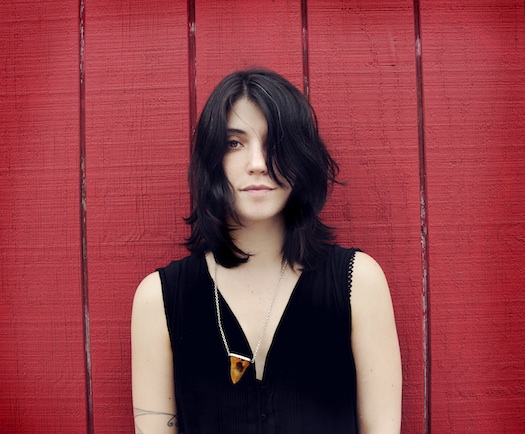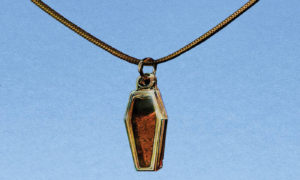 An ethereal haunting. A beautiful ache. Broken love and scars that smile. Life is no black and white analysis, but is made up of a complex series of contradictory feelings all competing to negate the other. There always seems to be a big ole “but.” These paradoxical themes are what define Sharon Van Etten’s fourth album, Are We There. It’s her second on Jagjaguwar after 2012’s Tramp. Joining with the process is Stewart Lerman on production duties, which he uses to Van Etten’s advantage, accruing an incredibly diverse cast of musicians (including a personal favorite, American Primitive/blues guitarist Marisa Anderson) to give the album a sonically artistic component, casting the incredible songwriting talent of Ms. Van Etten in wax. Electronic drums on tracks like “Taking Chances” and “Our Love” are a decidedly different approach to the rawness felt on previous albums. “Serpents,” the lead single from the last album Tramp serves as an example of the type of representative sound Van Etten and her team were looking for; driving crunchy guitars accompanied by an evolving acoustic drum beat that dictated the ever-onward, headstrong approach she previously sought. But with the electronic accoutrements, we now begin to reconsider what type of journey an artist chooses to take in an industry where buttons dominate. To stay afloat, we must use equipment that is not archaic, or we take the chance of being left behind with the horse and buggy.
An ethereal haunting. A beautiful ache. Broken love and scars that smile. Life is no black and white analysis, but is made up of a complex series of contradictory feelings all competing to negate the other. There always seems to be a big ole “but.” These paradoxical themes are what define Sharon Van Etten’s fourth album, Are We There. It’s her second on Jagjaguwar after 2012’s Tramp. Joining with the process is Stewart Lerman on production duties, which he uses to Van Etten’s advantage, accruing an incredibly diverse cast of musicians (including a personal favorite, American Primitive/blues guitarist Marisa Anderson) to give the album a sonically artistic component, casting the incredible songwriting talent of Ms. Van Etten in wax. Electronic drums on tracks like “Taking Chances” and “Our Love” are a decidedly different approach to the rawness felt on previous albums. “Serpents,” the lead single from the last album Tramp serves as an example of the type of representative sound Van Etten and her team were looking for; driving crunchy guitars accompanied by an evolving acoustic drum beat that dictated the ever-onward, headstrong approach she previously sought. But with the electronic accoutrements, we now begin to reconsider what type of journey an artist chooses to take in an industry where buttons dominate. To stay afloat, we must use equipment that is not archaic, or we take the chance of being left behind with the horse and buggy.
Van Etten makes a decision of maturity. Where a plaintive solo performance might have once existed is now a piece that sits comfortably with itself, utilizing a contrasting array of guitar tones, a horn section, and the aforementioned electronic percussion to give Are We There a more stoic feel, with classic Van Etten melancholy permeating most of the eleven tracks. The melancholy is born from her voice, and with each record Van Etten learns how to use it increasingly more adeptly. Vulnerability creeps in hard on the sixth track, “I Love You But I’m Lost,” where she sings “Let’s turn it into something we can change/I love you but I’m lost/Between the pain and cost/I hold myself alive/I love you but I’m lost.” And earlier, “Disappointed in a lover/because they’re the only way/to know somebody in and out after a while/It’s all a challenge.” Van Etten is singing directly to us. She has the unique ability to single the listener out and speak directly to you, reaching out her hand and offering it as guidance. She knows what it’s like; she experienced a period of homelessness. And this honesty, this vulnerability, this finger on the pulse of the human spirit is what makes her album work. It aches, stretches, rolls around, cries, dies, and comes alive again—just like you and me. We live and laugh and learn to lose before realizing we are part of this grand animal occupying the same space as many identical animals. We are independent collaborators working together towards a semblance of human identity. It is artists like Van Etten who show us we are not alone, that independence is a choice and not the suggestion.
She teaches us about herself and we learn the answers to questions we ask of ourselves. “Everyone is crazy with their own life/Lies in existential you ever want to find your way out/Turn into yourself again and reach on out/to become your true self/You know me well,” she sings. I find this sentiment comforting in its ability to see the greater more chaotic picture of existential belonging. Our greatest fears lie in anticipation, so knowing the hopelessness of it all is the first step in creating something out of nothing.
But what is it about these paradoxical challenges that reveal so much about ourselves? “Maybe something will change?” asks Van Etten in the appropriately titled ninth track, “Nothing Will Change.” The more things change, the more they stay the same, as the cliché goes. But holy cow, her voice and the backing vocals give this track a soul not previously seen in Van Etten. Things do not change, but move back and forth on a balance. Sometimes you’re hot, sometimes you’re cold. Sometimes the heat outlasts the cold. But with each passing year, we learn how to balance, or rather, how to prevent imbalance. We may not always know what to do, but we certainly know what not to do. It’s another ode to consistency of the inconsistent that is life. But we can depend on it for that same reason—which is empowering! Let us not depend on fate to determine our experience or our happiness. To quote English poet William Ernest Henley, “I am the master of my fate/I am the captain of my soul.” On Are We There, Van Etten stands firmly at her own helm.










